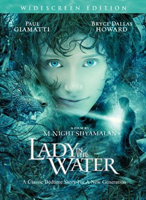BUY IT AT AMAZON: CLICK HERE!
STUDIO: Warner Bros.
MSRP: $28.98
RATED: PG-13
RUNNING TIME: 109 Minutes
SPECIAL FEATURES:
• Making-of featurettes
• Gag and audition reels
• DVD-ROM content
The Pitch
"It’s
a take on the possession of one of the Muses, only with less sex and blood, and
more goodwill."
The Humans
Paul
Giamatti, Bryce Dallas Howard, Bob Balaban,
The Nutshell
Once upon
a time, humans were idiots, or something like that. They left the oceans and
climbed up onto dry land, proceeding straight into murdering each other and
becoming inspiration-less husks of their former selves. Fortunately, there is a
race of magical creatures called "narfs" who exist only to bring inspiration
and beauty to certain humans. One such narf, named Story (Howard) arrives
unceremoniously at Cleveland Heep’s (Giamatti) apartment complex, But there are
forces that would stop Story from completing her mission, and from ever
returning home alive…
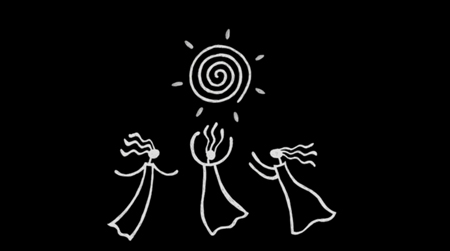
Come, worship at the altar of the kokopelli!
The Lowdown
Sometimes
I get really tired of meta. You know, films that comment on
fabric of storytelling. They exist and draw their potency from context; it may
make them clever or cute now but, unless they’re remarkably astute in their
observations, they become nothing more than curiosities, and faintly annoying
ones at that. So why on Earth did Shyamalan decide to weigh his already
hard-to-sell fable with pointless and winking attempts to sidle past the fourth
wall?
Fuck it. I
think there’s a really great fairytale underneath the crust of
self-appreciation. I’d rather not waste my time deconstructing the ways in
which Shyamalan’s script faltered under weightless meta-commentary and hubris. Russ’ review of the theatrical run (here) does a pointed job of that already.
What fascinates my critical mind about Lady in the Water are the myriad
ways its internal structure fails to support itself.
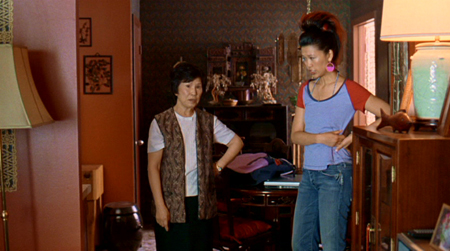
"But she’s a giant chicken! Why can’t you people see that?"
"Bock bock b-kaw?"
The film
is predicated on the success of melding a fantasy world, and all its attendant
rules, with the real world. Shyamalan isn’t exactly a young buck when it comes
to such a structure, having pulled it off at least twice over his past four
movies. Call this another miss, then, except this time it’s by a country mile. It’s
important for the fantasy world to have rules; otherwise the shaky suspension
of disbelief will tumble down. Even if those rules are only gradually revealed,
as they are here, they should maintain cohesion throughout, and be broad enough
to cover the situations in the script.
Instead,
we get a villain/monster who behaves erratically, perhaps following or breaking
rules Shyamalan never bothered to explain to the audience, and an artificiality
of tension as characters wonder about further ways these poorly defined rules
can be broken. The audience doesn’t care; until a character says, "They’re
not supposed to do this," we’re off in
to put us in the film’s moments.
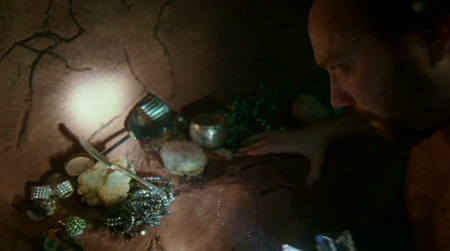
"Look at this stuff / Isn’t it neat?"
There are
further moments of artificiality in the awkward script which serve no purpose
other than to draw out the running time. In several situations, it’s as if
Shyamalan was being told by his internal editor that you can’t have progression
without conflict. So he inserts a needless scene of near-drowning in the middle
of a fetch quest, and withholds the details of the legend which define the
action for no other reason than because gradual revelation supposedly increases
tension.
It’s
Shyamalan’s least cohesive script, as far as I’m concerned. He bases nearly all
the drama in the third act on a simple act of misdirection. That kind of thing
was once Shyamalan’s calling card; now he conveys it like an amateur
illusionist, whose sleight-of-hand is far too slow to fool the audience. New
rules for the fantasy world are invented along the way, just to throw obstacles
in the path of resolution. Internal retconning is foisted on the audience to
add purpose to
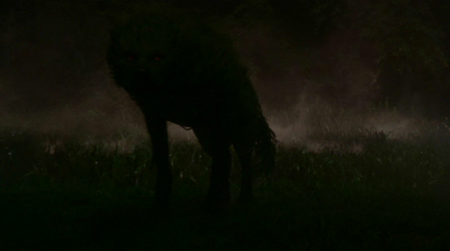
Whole damn movie’s got The Grim.
For all
the Tin Man lumbering the script does with the above, it’s the tangents it
takes which completely destroyed my involvement in the film. Shyamalan is
trying to tell a bedtime story. Bedtime stories, like folk tales, are
uncomplicated affairs. There is danger overcome and there is a moral. That’s
about all you need. I wish he would have stuck to such a formula, because the
moral he picked is a sweet and timeless one. Discover who you are, it says. We,
however, do not need a wealth of examples of the axiom in practice shoehorned in
with no dramatic arc. We also don’t particularly need a prematurely ejaculated
emotional resolution for
moral exposited.
I’m not
even touching the presence of Bob Balaban’s film critic, who possesses a divine
knowledge of the world, and sticks out of the story like a sore thumb that
can’t fold itself back in. Lady in the Water ends up being a
microcosm of Shyamalan’s work: dreadfully uneven, possessing admirable moments
of technique, featuring the philosophical depth of a kid who just learned how
to pronounce "Nietzsche," and containing more deuses ex the machina than
I’m prepared to criticize. Write me a simple story, Shyamalan. Don’t get so
lost in your fantasies that you lose sight of the audience.
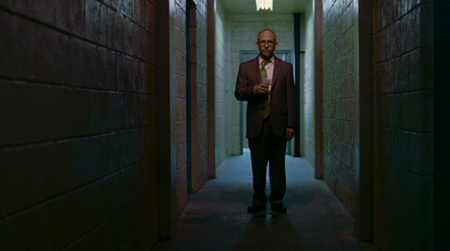
"Hi. I’m Bob Balaban, and I’m a character actor."
"Hi, Bob!"
The Package
The
bonuses include two featurettes: an origin of the film’s idea and its
adaptation into cinematic form called "Lady in the Water: A
Bedtime Story," and a six-part behind-the-scenes thing called
"Reflections of Lady in the Water." Both smell
heavily of fluff and are a bit light on information.
You also
get a gag reel, a brief audition clip of bit players, trailers, and some light
DVD-ROM content.
4.9 out
of 10
